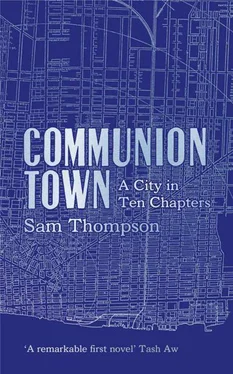‘The theory then arises that Lazarus Glass was not in fact responsible for the murders tonight.’
I took a breath, and hesitated.
‘Go on, Cassandra,’ Peregrine said.
‘It is possible that some other person contrived the killings of the detectives, in order to impose a significant change on Glass’s consciousness. I have already suggested the nature of that change: he is diminished by the loss of his worthy enemies. As to the identity of this unknown killer, one possibility is compelling.’
I looked at my mentor where he lay with fingers laced and ankles crossed.
‘The probable culprit, Dr Fetch, is you.’
‘Good God,’ said the inspector.
‘Sound work, Cassandra,’ said Peregrine. He rose from the sofa and came towards me, his grey eyes fixed on mine. He reached out with both hands and squeezed my shoulders gently, before turning to the inspector and grasping his hand. Then he moved past us both to stand by the mantelpiece.
‘I have known for a long time now — ever since I understood the nature of the memory city — that the surest way to end the criminal career of Lazarus Glass would be to put an end to the detectives against whom he has always defined himself. For a number of years I hoped that it would be possible to find some other way around his defences; it has taken me until tonight to satisfy myself that no other way exists.
‘The deaths of Hyperion, Electra and Brutus were necessary to the negation of Lazarus. By usurping his role as killer, devising each quietus in a manner that belonged rightfully to him, I have robbed him forever of three potent symbols. He will feel their absence from his memory city as a numbing ablation of his powers. But he and I both know well that, so long as I hold my place as the city’s greatest detective, he will remain as my diabolical opposite, dreaming our city’s reality with his dreams of death and vice. For so long, and no longer.’
Peregrine opened the cigar box on the mantelpiece and took out the revolver.
‘I have worked too long in this memory city of Lazarus’s, with its maddening mesh of symbols. To leave it will be pleasant.’
He thumbed a catch on the weapon and checked its chambers.
‘The night’s work is nearly done. Thank you.’
He gestured towards the window.
‘If you look out at the city, you will observe its transformation. You will witness the defeat of Lazarus Glass,’ said Peregrine.
Beyond the window, the sky glowed in bands of pink and yellow, threaded with irregular silver ribbons. All across the rooftops, points of light gleamed off those tiles and slates that were angled towards the dawn. We heard the gunshot and the thump of a body falling, and then silence, but we did not turn around.

When Stephen’s message came I had nearly forgotten him. Time passes, and on most days he never entered my thoughts, or if he did it was faintly and far off. But without warning now he wanted to see me again, and, although he didn’t say why, I could find no way not to agree. I found myself walking along Impasto Street on a dark afternoon in mid-December when some influence had sent people out into the city in large numbers, jostling to spend money, zealous and hard-faced, shouldering each other aside.
He caught me unawares, laying his hand on my arm so that I flinched. I’m on edge in crowds. It took me several moments to recognise him, but he gave me as long as I needed, holding his gaze steady. Then he squeezed my shoulder and led me across Clarinet Street, back the way I’d come. We dived down a lane towards a bar which I only glimpsed as a blot of red and yellow before we were inside. He bought two pints and we sat down in a corner.
I kneaded the cold out of my hands. The message had made it sound as though we still saw each other all the time. I was surprised he’d picked me out again, but then our friendship had always been unexpected. I had known from our first meeting that we were not equals. He still had a way of making me — what’s the word? Making me eager, perhaps. I was always too eager. After setting down my drink he didn’t say anything. He sipped his beer, studied me slowly, smiled. It was time for me to ask why he had wanted to meet; why he had waited so long. Instead I began to babble, spouting clumsy trivia and asking about irrelevant things, where he lived, what he was doing for work. I could tell he was faintly amused in the old manner.
The bar was filling up with students and workers from city centre offices, all a few years younger than us. I took a sip which went down wrong, and struggled not to cough. Stephen watched with his lips parted and his head angled tolerantly. Just as ever, he was curious about my embarrassment, interested in the effects of his presence. An expression which might have been fondness passed across his face; but the pause grew longer, and I saw he was not going to reveal why he had contacted me. In the old days it had been his habit to withhold what I was waiting for him to tell. My face was hot in a familiar way.
To my surprise, however, Stephen himself now looked puzzled, as though his intention in asking me to meet him had temporarily slipped his mind, or he had forgotten I was with him at all. His eyes slid towards the snug on the far side of the bar, but as far as I could tell he was distracted by no more than an unoccupied table under a green glass lampshade. Weeks later, when he decided to tell me the real story, I would remember this moment. A group of students crowed with laughter and fell silent.
We contemplated the remains of our pints and in the hiatus I stole a look at him. He had changed more than I’d realised at first. The dark hair was thick but it didn’t have its old shine, and his eyes were veined and watery from the cold. In his face I could discern the seams where the skin would slacken and fill. He had on the sort of scruffy old clothing he had always made effortlessly cool, but you might not immediately have known, now, that the untidiness was a matter of style. It struck me that his best time had been his youth.
Before I could find anything else to say, he rose from his seat, grabbing his jacket and leaving his drink unfinished. His eyes kept darting to the other side of the room. Not pausing to say goodbye, he disappeared up the stairs to the street, leaving me to gather up my belongings. I caught my train an hour earlier than I’d planned.
At university Stephen and I had read different subjects. We both had our first-year accommodation in the hall of residence on Juno Square, with rooms on the same corridor, but beyond this there had been no obvious reason for us to associate. From the beginning you could guess at the career he was going to have here and the sort of people he would mix with. On the first day I saw him talking easily to groups of the older students. The beautiful, the fine-looking, the immaculate, assured ones whom I dared not gape at — they had gravitated to him. It was nothing easy to define, but they recognised his suitability. He exuded a natural right; his flirtatious, ingenuous manner worked with men and women just the same.
I was bewildered, meanwhile, in spite of the jollying welcome activities that had clogged up the whole of Belltown. Stephen didn’t come to the clubs-and-societies fair, the pub crawls or the quizzes. While I was too timid to stray outside alone, he always had somewhere to be. When, carrying a mug and a slice of toast back to my room from the shared kitchen on the second or third night, I passed him on our staircase, he had combed his hair back and was wearing a dark suit which fitted him superbly. He twitched an eyebrow at me and disappeared out into the streets, and soft laughter moved past my door at six o’clock that morning.
Читать дальше
Конец ознакомительного отрывка
Купить книгу













